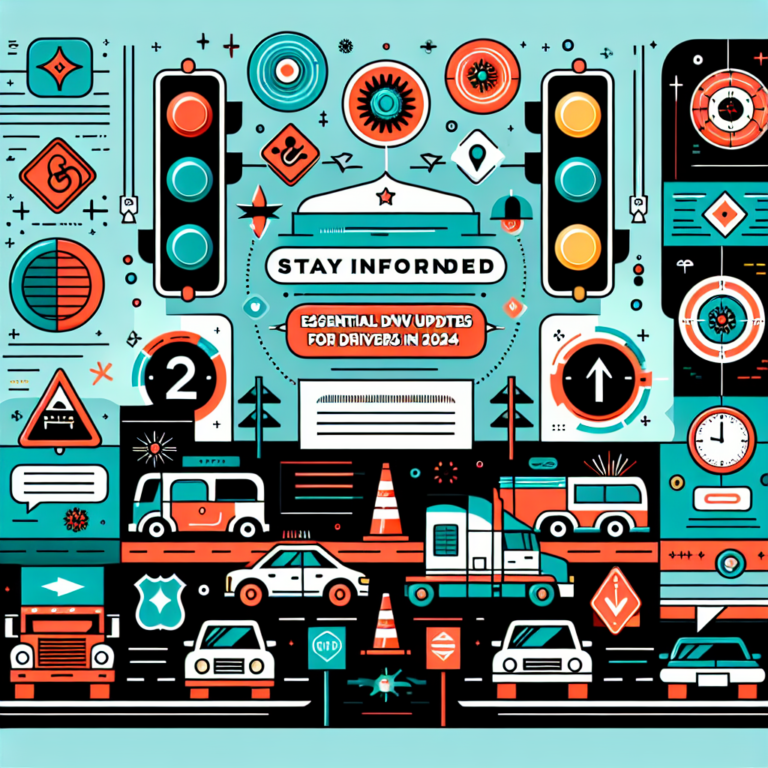As we step into 2025, drivers across the United States need to stay informed about updates and changes to the Department of Motor Vehicles (DMV) regulations and services. These updates can affect everything from licensing and registration to fines and emissions standards. Here’s what you need to know to navigate the road ahead safely and efficiently.
1. New Identification Standards
With the increase in domestic and international travel, several states are rolling out new identification standards. The REAL ID Act, which requires specific security features for identification, has become even more relevant. By May 7, 2025, every air traveler will need to present REAL ID-compliant identification to board domestic flights. In 2024, DMVs are ramping up efforts to educate the public about obtaining a REAL ID. Make sure to check your state’s DMV website for requirements, including what documents you’ll need to bring.
2. Enhanced Online Services
In response to the pandemic and shifts toward digitalization, many DMVs are enhancing their online services. In 2025, expect more comprehensive online platforms that will allow drivers to renew licenses, register vehicles, and update addresses without having to visit a DMV office. Look out for updates on your state’s website to learn about these new services, as they can save you time and hassle.
3. Changes in Licensing Requirements
Several states are re-evaluating their licensing procedures, especially for young and new drivers. For 2024, there’s an ongoing trend towards stricter rules for obtaining learner’s permits and full licenses. This includes longer waiting periods, mandatory driver education courses, and more stringent testing. If you or someone you know is in the process of getting their license, be sure to research these changes thoroughly.
4. Emissions Standards Updates
Environmental concerns continue to shape policies at the state level. In 2025, many states are introducing stricter emissions standards for vehicles. California, for example, is leading the way with new regulations aimed at reducing greenhouse gas emissions from cars, which may include increased fines for non-compliance and incentives for electric vehicle (EV) ownership. Depending on your state, these changes could impact registration fees, emissions testing requirements, and available carpool lane benefits.
5. Changes to Fees and Fines
In 2025, several states are reviewing their fee structures for licenses, registrations, and fines for traffic violations. Drivers may see an increase in registration fees or penalties for certain infractions. Some states are also exploring tiered fee systems, where fines are based on income, making penalties more equitable. Ensure you’re familiar with the latest fee schedules from your local DMV to avoid any unexpected costs.
6. Driver Education and Safety Programs
A renewed focus on driver safety is leading DMVs to enhance educational programs geared towards reducing accidents on the road. In 2025, expect more robust programs aimed at new and experienced drivers, including defensive driving courses, distracted driving prevention, and updates on sharing the road safely with cyclists and pedestrians. Engaging in these programs not only enhances personal safety but may also lead to discounts on insurance premiums.
7. Adaptation to Autonomous Vehicles
As technology continues to evolve, the rise of autonomous vehicles presents new challenges and regulatory questions for DMVs nationwide. In 2025, many states are formulating policies related to the testing and operation of self-driving cars. Drivers need to be aware of how these changes may affect the legal landscape around liability and insurance. Updates regarding the permissible use of autonomous technology on public roads will be ongoing throughout the year.
8. Public Engagement and Feedback Opportunities
States are becoming increasingly aware of the importance of public input in shaping DMV policies. In 2025, many DMVs are opening platforms for drivers to share their experiences and provide feedback on services. Participating in these opportunities can help drive meaningful change and influence how your local DMV operates.
Staying informed about DMV updates in 2025 is essential for every driver. Whether it’s understanding new identification requirements or adapting to changing emissions standards, being proactive can save time, money, and stress. Regularly checking your state’s DMV website and staying engaged with any community announcements will help you navigate the evolving driving landscape effectively. Safe driving and informed decisions go hand in hand—let’s embrace a responsible and aware year on the roads ahead!


